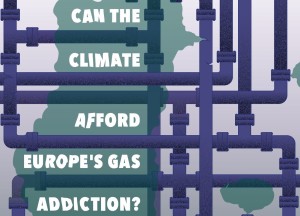
For decades the oil industry has employed an ingenious yet deceitful public relations strategy in response to climate change, largely copied from the playbook refined to perfection by the tobacco barons and their spin-doctors.
In the nineties, their initial response was to deny the problem of climate change existed, to challenge the evidence and to promote uncertainty in climate science.
Some in the industry or their supporters still promote this view, which is largely propagated in the higher echelons of the Trump Administration.
Others, though, have turned a few more pages of the playbook in order to argue that, although the fossil fuel industry has largely been responsible for the problem of climate change, it is also now key to the solution.
Central to this argument is that, although coal and oil may be dirty, gas is much cleaner and can be a bridge between the dirty fossil fuels and the fledgling renewable technologies. Clean gas, goes the argument, can have an “indefinite future” in the fight over climate change.
Buying into the idea that gas is supposedly “green”– which actually is a complete and utter misnomer – there has been a massive expansion in gas in the US and also in Europe. Much of this comes from shale and is extracted by fracking, a controversial technique in its own right.
For years, scientists and others have warned that gas is not green at all, due to many reasons, but one of the main ones is the potential loss of methane, a potent greenhouse gas.
The issue of methane emissions from gas will be debated at this week’s climate talks in Bonn, which are being presided over by the Government of Fiji.
And now new research by the Tyndall Centre for Climate Change Research and commissioned by Friends of the Earth, argues that gas is not a bridge fuel to a clean energy future and that the methane emissions from gas have been severely underestimated.
The report Natural Gas and Climate Change by Professor Kevin Anderson and Doctor John Broderick of the Tyndall Centre for Climate Change Research reveals the urgency with which Europe needs to phase-out all fossil fuels
It outlines how “Natural gas has been presented as a ‘bridging fuel’ that can play an important role in facilitating the transition to a low carbon economy, complementing a significant increase in the utilisation of renewable energy sources”.
However, “In order to quantify the maximum level of EU natural gas consumption compatible with existing EU targets and the Paris Agreement, the relative lifecycle carbon intensity of a range of potential natural gas sources must be more fully understood, particularly methane leakage”.
Methane leakage means that gas is not clean or green. What the scientists found is that gas has no future if we are to try and limit global warming to 2 degrees.
The report concludes that “there is categorically no role for bringing additional fossil fuel reserves, including gas, into production,” if we are to meet the Paris 2°C and equity commitments, and have stopped all fossil fuel use within 2 decades.
The scientists report that: “If we are to achieve the objectives of the Paris Agreement to hold ‘the increase in the global average temperature to well below 2°C above pre-industrial levels and pursuing efforts to limit the temperature increase to 1.5°C above pre-industrial levels’ it is imperative that energy systems globally are fully decarbonised within the coming three to four decades. For the EU, fossil fuels, including natural gas, can have no substantial role in an EU 2°C energy system beyond 2035.”
They also urge that “An urgent programme to phase out existing natural gas and other fossil fuel use across the EU is an imperative of any scientifically informed and equity-based policies designed to deliver on the Paris Agreement.”
Indeed, Friends of the Earth argues that “The world’s carbon budget, and Europe’s, is fast running out … Gas, like coal and oil, cannot be considered as a short or a medium-term solution”.
FOE contends that the EU’s energy system needs to be transformed rapidly to be fossil fuel free by 2030 and that the EU should immediately end all fossil fuel subsidies, including grants or loans to gas infrastructure projects and ensure that the next EU budget is a fossil free budget.
Antoine Simon, a spokesman for FoE said: “It is intolerable to see the European commission and its members giving support to an increasing number of gas projects that will lock us in to decades of fossil fuel addiction. As the UN reminded us last week, we are currently paving the way to a 3C temperature rise. Facing the prospect of being ‘toasted, roasted and grilled’, it is unconscionable that the EU is turning its back on the urgent climate action needed to remedy this situation.”
